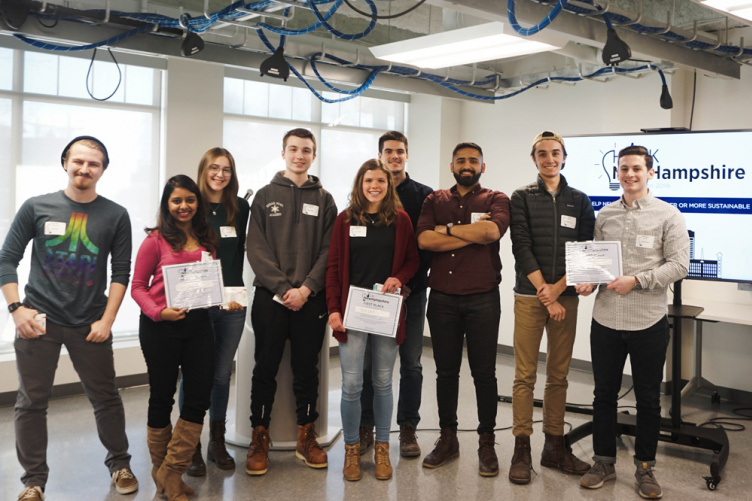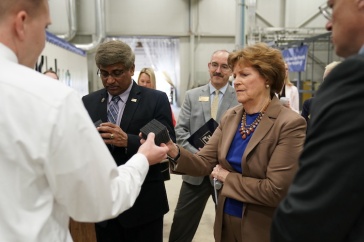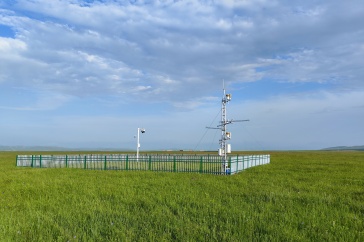
The UNH-IOL's hackathon for 2019 brought together students from multiple schools, colleges and majors. Here are this year's winners. Photo Credit: IOL
Get To Know the IOL

The UNH-IOL is a leading test facility for data and networking communications products and works with companies all over the world — from local tech firms to Fortune-500 businesses — testing technologies in more than 35 areas.
Employing more than 100 UNH students and being at the forefront of breaking technology, the IOL started hosting its 24-hour hackathon challenge in 2018.
The snow had started to fall, and students were back and ready for spring semester. This could only mean one thing: It was hackathon time at the UNH InterOperability Lab (UNH-IOL).
The challenge invites UNH students from all colleges and majors to collaborate on a project or problem domain, strategize an innovative solution and present it to judges, with this year’s theme of Hack New Hampshire (Hack NH) asking students to collaborate on solutions that would help the state become safer or more sustainable.
One of this year’s goals was to attract students outside of the College of Engineering and Physical Sciences (CEPS) who might shy away from a coding and programming-heavy challenge in order to encourage cross-disciplinary collaboration. With three New Hampshire-based companies sponsoring the event — Liberty Mutual, Bottomline Technologies and Arista — the IOL was ready to start driving engagement across campus. Through a partnership with the ECenter’s i2 Passport program, the event was attended by more than 35 graduate students and undergraduates not only from CEPS but also from the College of Liberal Arts, Paul College of Business and Economics and the Carsey School of Public Policy, to name a few.
“Being a first-year student, I had no idea what I would be getting myself into, especially since I am not very tech-savvy,” says Emily Handy ‘22, a psychology major. “However, being a part of this hackathon was probably the first time I really felt part of the UNH community. I now love the school even more than I did, and I walked away from the hackathon with much more self-confidence, more leadership skills and more of a drive to be a part of creating positive change in the community. I did not expect to come out of this event with as much as I did, but I am so glad I decided to be a part of it.”
A total of 10 teams participated in the challenge. Students arrived on a Saturday and didn’t leave the lab until Sunday afternoon, spending all night working on their projects. Some students came in as teams while other participants were grouped based on their skillsets, majors and year in school. After nearly 24 hours, a few cases of RedBull and plenty of tasty food for fuel, each team had to close their laptops and prep for the final — and possibly most important — stage of the competition: the presentation.
"I walked away from the hackathon with much more self-confidence, more leadership skills and more of a drive to be a part of creating positive change in the community."
Each team was judged on technical innovation, creativity, uniqueness, usefulness and presentation. This is where the cross-disciplinary strengths came into play; for example, one team had students in computer science, computer engineering, marketing and business, which helped them divide and conquer both the presentation and the project.
“It was great working with other students that I wouldn’t normally interact with since most of us are in different majors — not even similar fields,” says Jessica Nelson, ‘21, a business administration major.
Nelson was a member of Eco Salt, which took home first place at Hack NH. The team used a Google and OnWater application programming interface (API) to create a mobile app that would notify plow and salt drivers of low-salt areas. There is an ongoing problem caused by sodium chloride draining into wells, tainting water and killing aquatic organisms. The application could potentially decrease salt distribution while ensuring the safety of drivers in slippery areas.
“Working with my team was a great learning experience for me, and it felt great knowing that I could participate in a hackathon challenge, which I would never think was possible, and bring my skills learned in the classroom to good use,” Nelson says.

Eco Salt was one great example of how cross-disciplinary teams proved successful at the event. The second-place team, UShield, consisted of two CEPS majors and a psychology major. This team designed an app that allowed students to order a “buddy” when walking home or across campus late at night, a similar concept to Uber for rides. Ushield’s solution was designed using Google and Liberty Mutual’s Shine API.
“Hack NH provided me with a great opportunity to meet people in the industry, develop my technical skills and collaborate with people from different majors,” says Matt Lemire ‘20, a computer science major. “Working together to design a safe and sustainable solution to benefit New Hampshire was challenging but getting behind an idea we were passionate about and then presenting to the judges was both exciting and rewarding.
“This event introduced me to a lot of awesome people and helped advance my business and entrepreneurial capabilities, something I don't get the chance to cultivate in my formal coursework.”
After each team presented, it was time for judges’ deliberation.
The panel of judges was made up of industry professionals from each sponsoring company along with Matt Plumlee, computer science lecturer, and Timothy Carlin, senior executive, software development at the UNH-IOL. Three teams were awarded cash prizes for first, second and third place. Awards for technical and innovative solutions were given to two additional teams.

Learn more about the opportunities available through the UNH-IOL.
-
Written By:
Mara Bernazzani | IOL Communications Coordinator | mbernazzani@iol.unh.edu | +1-603-862-0901

















































